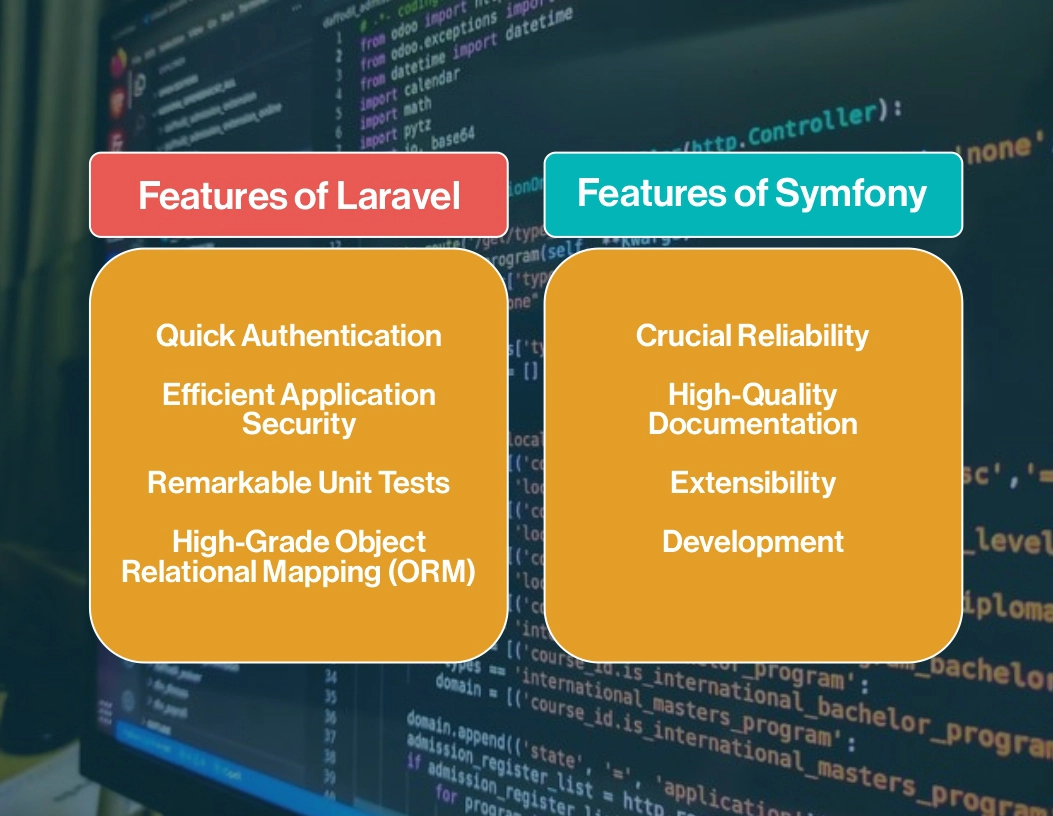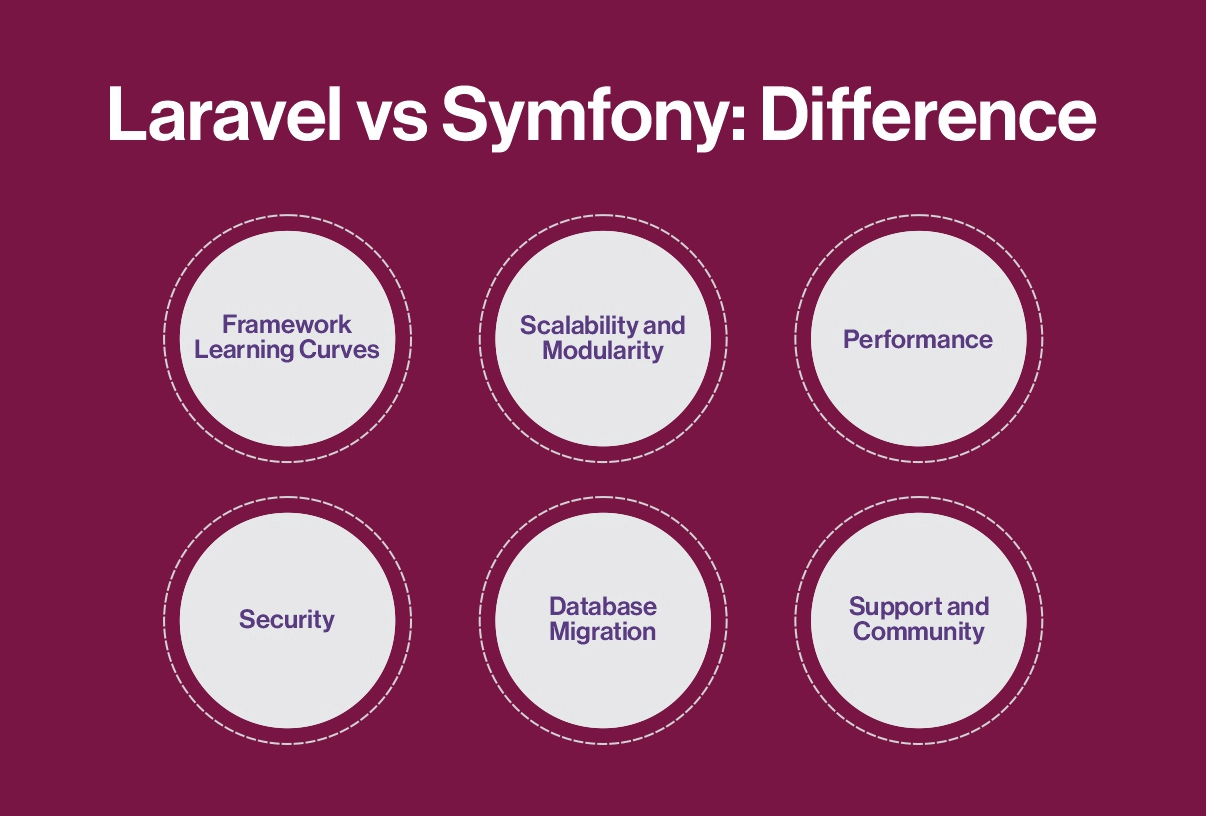Starting a new software project often involves a crucial decision: selecting the right framework. Nowadays, building a robust web application from scratch without a framework is quite challenging. Here is the comparison "laravel vs symfony".
Many major web development languages have default frameworks like Django for Python or Ruby on Rails for Ruby. PHP, however, offers multiple popular options without a default choice. Yet, PHP frameworks are the most popular and frequently used in web development.
Among the array of PHP frameworks available, Laravel and Symfony reign as top choices for developers. These frameworks have held their ground as industry favorites for years, particularly for optimizing code and streamlining processes, key factors enhancing performance and efficiency.
GitHub highlights Laravel with 73.6k stars and Symfony with 28.4k stars, attesting to their popularity. Both frameworks facilitate efficient development that aligns with business needs and future adaptability, enabling multilingual, cross-platform content creation.
But here's the question: which one should you choose?PHP frameworks are the most used for web development for various reasons. Their high development speed, scalability, security, and reusability make them prominent across web development platforms. The two most popular PHP frameworks are Symfony and Laravel. There is debate among developers about which is better. Hence, many software projects outsourcing companies use both Symphony and Laravel.
In this article, we will compare Laravel and Symphony and see how they are used in IT outsourcing services by top IT outsourcing service companies.
What is Laravel?
Laravel is an open-source PHP framework and follows an MVC (model-view-controller) design pattern. It has an easy syntax and offers multiple built-in components to create web applications. Laravel is known for its simple approach to coding.
Laravel stands as a top-tier open-source PHP framework renowned for its innovative syntax and support for the MVC architecture. Recognized for its rich feature set, it excels in rapid development, minimizing configuration hassles.
The recent release of Laravel 10 has marked its rapid growth, leveraging elements from various frameworks to streamline web application development. Its unique capability to segregate business logic and display code simplifies coding, ensuring a lightweight and automated process.
One of Laravel's strengths lies in its robust security measures, boasting built-in authentication and password features that mitigate the risk of data breaches and malware attacks. Let's delve into the key features that establish Laravel as a dependable framework:
- Embraces the model-view-controller (MVC) design pattern
- Integrated authentication and session management
- Robust unit testing capabilities
- Employs the Blade template engine
- Provides access to the Artisan command-line tool
Pros of Laravel
- It is always in upgraded form with the latest PHP features
- It offers rapid development with easy-to-learn and easy-to-read syntax
- It is highly compatible with third-party libraries and platforms
- It uses a template engine to create layouts for web apps and format data
- It allows adding new features and modules without making changes in the core
- It offers automated testing methods to reduce time-consuming functions
- It allows the integration of third-party apps through API
Cons of Laravel
- Applications built on Laravel are heavy and have a high load time on mobile
- There are fewer third-party libraries available for Laravel which makes quality and reliability harder for developers
- Laravel is lightweight and sometimes causes backend data congestion due to excessive database queries
- Laravel updates are mostly incompatible. Shifting to a new version can break the previous code
- Dependency injection is complex
Features of Laravel
Here are some key Laravel features that enhance seamless web development:

Quick Authentication
Laravel simplifies authentication with a native system, streamlining the setup of controllers and models for smooth app functionality.
Efficient Application Security
Security is paramount, and Laravel addresses it well by employing the Bcrypt Hashing Algorithm, ensuring robust protection for applications.
Remarkable Unit Tests
Laravel shines in the realm of unit testing, offering a developer-friendly environment to conduct multiple tests, aiding in quick bug identification and cost-effective solutions.
High-Grade Object Relational Mapping (ORM)
The built-in ORM functionality allows developers to interact with database tables using simple PHP syntax, reducing the need for direct SQL coding. This seamless integration between developers and databases streamlines the development process.
Laravel Installation
Installing Laravel is straightforward and similar in ease to Symfony's PHP framework. The primary difference lies in acquiring Laravel's installer via Composer:
# Downloading Symfony installer
sudo curl -LsS https://symfony.com/installer -o /usr/local/bin/symfony
# Granting permissions to execute installer
sudo chmod a+x /usr/local/bin/symfony
# Creating new Symfony project
symfony new symfony_project
# Launching built-in server
cd symfony_project/ && php bin/console server:start
Now, you can go to http://localhost:8000 to test your Laravel installation.
What is Symfony?
Symfony is also an open-source PHP framework for web development. Symfony MVC framework makes it easy for developers to develop scalable applications. It has a library of resources and components which include Symfony Event Dispatcher, DomCrawler, Symfony YAML, Symfony Templating, Discord Notifier, Symfony Dependency Injector, and many more. Symfony is one of the best PHP frameworks for developing enterprise-level website development projects. Symfony framework pros and cons are mentioned below.
Symfony, created by Fabien Potencier in October 2005 under the MIT license, boasts a robust community offering substantial support and scalability. This framework ensures a wealth of options for every end-user. Also, if specific elements are missing, customization is seamless within Symfony, even leveraging the Symfony filesystem.
Employing the MVC (Model View Controller) model, Symfony maximizes its PHP framework capabilities. However, unlike the MVC-centric Laravel, Symfony prioritizes eliminating coding challenges and saving time throughout the PHP development journey.
Symfony thrives on flexibility, enabling users to tailor software to their unique needs. It simplifies developers' tasks through readily available bootstrap elements, advanced configurations, and framework components. This PHP framework comprises 50 independent parts, serving as the bedrock for Symfony applications, fostering adaptability and versatility. Hiring a Symfony development company can help you make your web development process smoother.Pros of Symfony
- Symfony is a perfect choice for scalable projects. Its 4+ upgrade has high performance and less complexity
- Symfony provides the flexibility of making changes in code to customize web solutions and apps
- One of the biggest advantages of Symfony is that it offers a variety of components that can be used for certain functionalities. It eliminates the hassle of writing lengthy and complex code
- Symfony has high support for databases
- Symfony features make code easy to configure with its bundle of components
- Unit testing is easy in Symfony and this is the reason why it is a comfortable choice for developers
- Considering Symfony vs Laravel security, Symfony has advanced security capabilities to develop secure applications
Cons of Symfony
- High traffic on apps reduces their performance in real time
- Symfony requires more time to learn its complex frameworks and components
- The development process of Symfony is slow
- Testing is a time-consuming process
Features of Symfony
Here are some standout Symfony features that contribute to efficient development:
Reliability
Symfony is renowned for its reliability, making it a top choice among developers for high-performance app development.
Documentation
Unlike many other frameworks, Symfony boasts comprehensive and well-presented documentation, simplifying the workflow for developers.
Extensibility
Symfony's architecture allows for easy reuse of bundles, reducing the need to modify the framework extensively. Configuration adjustments within Bundles cater to specific project needs.
Development
Symfony simplifies development tasks, minimizing the complexity of operations and functionalities. Its Bundle-based architecture makes it suitable for projects of varying scales.
Symfony Installation
The Laravel installation process mirrors the simplicity of Symfony, with the distinction being how you acquire Laravel's installer using Composer:
# Downloading Laravel installer using Composer
composer global require "laravel/installer"
# Creating new Laravel project
laravel new laravel_project
# Launching built-in server
cd laravel_project/ && php artisan serve
Now, you can head to http://localhost:8000 to verify your Laravel installation.
Note: Laravel and Symfony utilize the default localhost port (8000), preventing concurrent running of these default instances. To resolve this, ensure that the Symfony server is halted by executing the PHP bin/console server: stop before initiating the Laravel server.
Laravel vs Symfony: Similarities
Both Laravel and Symfony, being PHP-based frameworks, share several commonalities. Here are some notable similarities:
- Laravel and Symfony are built using PHP as their core programming language.
- They are cross-platform frameworks that enable development across various operating systems.
- Both frameworks support multiple languages and accommodate multiple users.
- They offer framework functionalities, text search support, and interface design patterns.
- Both Laravel and Symfony endorse the MVC (Model-View-Controller) design pattern and provide Object-Relational Mapping (ORM) support.
- Both frameworks offer Command-Line Interface (CLI) tools for standard functionalities, including developer testing tools.
- They facilitate full-stack development, operating across diverse platforms efficiently.
- Laravel and Symfony come equipped with properties for internationalization and extensibility.
- Both frameworks enjoy extensive developer support from vast and active communities.
Laravel vs Symfony: DifferenceLet's differentiate Laravel and Symfony across relevant parameters:

Framework Learning Curves
Symfony indeed presents a steeper learning curve compared to Laravel. While Symfony offers valuable documentation, the abundance of tutorials and community support might not be as extensive as what's available for Laravel.
Laravel excels in providing a shallower learning curve. Developers, whether beginners or seasoned professionals, can easily grasp the ins and outs of this framework. Its comprehensive documentation, video resources, and extensive tutorials provide a user-friendly learning experience, making it accessible to a wider range of developers.
Scalability and Modularity
Symfony's architecture, with its reusable components, offers exceptional modularity. Its structural simplicity is particularly advantageous for complex software projects, drawing the preference of many seasoned PHP developers over Laravel.
Laravel, relying primarily on the MVC pattern, excels within that structure but may pose challenges if deviating from it. While it facilitates swift application initiation, construction, and operation through pre-built dependencies, caution is necessary when selecting plugins and dependencies for larger-scale applications within the Laravel framework.
Performance
In its early versions, Laravel surpassed Symfony in performance. However, this scenario has shifted with subsequent updates and advancements in the Symfony PHP framework. The once-touted enhanced performance of Laravel may no longer hold true.
The performance of both frameworks can fluctuate significantly with each iteration update. At Radixweb, our developers are proficient in both Laravel and Symfony. We meticulously track each iteration release, selecting the optimal application performance framework.
Security
Symfony boasts a more robust security system than Laravel. However, its implementation might require a steeper learning curve. Symfony offers diverse authentication methods and a detailed permission system for fine-grained access control.
Laravel prioritizes simplicity in security maintenance, providing straightforward features that typically cover most basic security needs.
Database Migration
Symfony frameworks streamline database migrations by automating the process, requiring simple model field definitions. This automated approach often feels like a significant win.
Laravel framework entails manual database migrations, albeit without the need for field definitions. Both Laravel and Symfony showcase their respective advantages in handling database migrations.
Support and Community
Symfony PHP framework boasts impressive documentation, yet its learning curve remains steep and challenging. In contrast, Laravel enjoys extensive tutorials, diverse courses, and a robust online support system, thanks to its prominence within the development community. The learning process tends to be more challenging with Symfony than Laravel.
Final Thoughts
Both Symphony and Laravel are top PHP frameworks for web development. It is difficult to choose one. However, Symphony vs Laravel speed and performance are often compared but it totally depends on the requirements of your project. Laravel is a perfect choice for startups, whereas Symphony is highly supportive for high-scale and long-term projects. For customization requirements, Symphony is a suitable option as it has various built-in components that allow you to build projects without developing complex functions.
Both Laravel and Symfony stand as reputable and popular PHP frameworks. The key is understanding your project's scope, required features, and functionalities and aligning these with your business objectives. Carefully addressing these aspects will guide you to the framework that best serves your needs. Hire the right Laravel and Symfony development company to get suitable outcomes!
FiveRivers Technologies, being one of the best software outsourcing companies, uses both Laravel and Symphony to build tailored software solutions for businesses.

